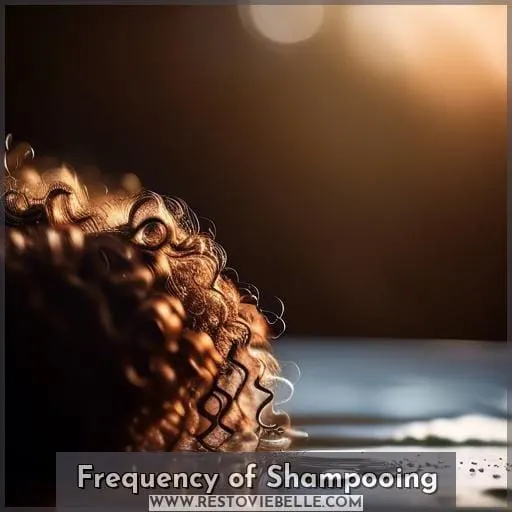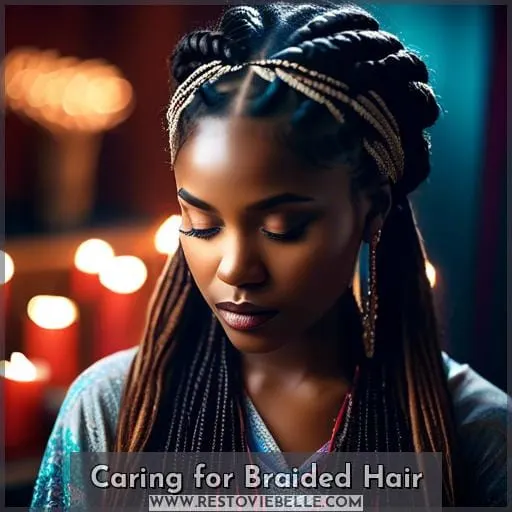This site is supported by our readers. We may earn a commission, at no cost to you, if you purchase through links.
 Throwing caution to the wind, you might wonder if drenching your natural tresses daily is the secret to luscious locks. While a splash of water can reinvigorate your curls and combat dryness, it’s not a one-size-fits-all answer.
Throwing caution to the wind, you might wonder if drenching your natural tresses daily is the secret to luscious locks. While a splash of water can reinvigorate your curls and combat dryness, it’s not a one-size-fits-all answer.
Wetting your hair every day can offer a hydration boost and help with styling, but it’s vital to balance this with proper moisturizing techniques to prevent over-saturation and tangling.
Dive into the nuances of daily hair wetting and discover tailored strategies to keep your natural hair thriving.
Table Of Contents
- Key Takeaways
- Daily Wetting Versus Washing
- Wetting Natural Hair Benefits
- Frequency of Shampooing
- Managing Tangles After Wetting
- Moisturizing Strategies
- Nighttime Hair Care
- Caring for Braided Hair
- Adjusting Hair Care Routine
- Frequently Asked Questions (FAQs)
- How can I protect my natural hair from damage if I choose to wet it daily?
- Are there specific water temperatures that are better for wetting natural hair?
- What are the best practices for drying natural hair after wetting it to maintain moisture?
- How does the porosity of natural hair affect how often it should be wet?
- Can wetting natural hair daily contribute to or help prevent scalp issues such as dandruff or itchiness?
- Conclusion
Key Takeaways
- Daily wetting without shampooing is beneficial for natural hair, as it helps maintain moisture without stripping the hair of its natural oils. This practice is especially advantageous for Type 3 and Type 4 curls, which are prone to dryness and tangling. Wetting the hair can refresh curls, add moisture, and help detangle, making it easier to style and manage.
- Hydration is crucial both internally and externally for maintaining healthy natural hair. Drinking adequate amounts of water and ensuring the hair is properly hydrated can prevent dryness and tangling. Hydration plays a significant role in regulating body temperature and the sleep-wake cycle, which indirectly affects hair health.
- Using the right products and techniques can enhance the benefits of daily wetting. Incorporating leave-in conditioners, oils (such as coconut oil or argan oil), and the LOC method (liquid, oil, cream) can help lock in moisture, particularly for 4c hair. These practices can preserve natural oils, combat dryness, and maintain scalp health.
- It’s important to adjust hair care routines based on individual needs and avoid over-wetting, which could lead to hygral fatigue. Assessing the hair’s hydration needs, performing a porosity test, and considering styling choices and products used can help in creating a balanced routine that promotes hair health without compromising the natural oils essential for maintaining moisture.
Daily Wetting Versus Washing
Understanding the nuances of hair care is crucial, especially when it comes to maintaining the health of natural hair. Wetting your hair can help to reset your curls and add much-needed hydration. It’s important to distinguish this from washing, which can strip your hair of its natural oils if done too frequently.
You might wonder if it’s beneficial to wet your natural hair daily as opposed to washing it with shampoo. Wetting your hair can help to reset your curls and add much-needed hydration. However, it’s important to distinguish this from washing, which can strip your hair of its natural oils if done too frequently.
Understanding the Difference
The first sentence for the subtopic ‘Understanding the Difference (Daily Wetting Versus Washing)’ in the article titled ‘Should I Wet My Natural Hair Daily? Essential Care & Moisture Tips’ could be:
You mightn’t realize it, but there’s a significant difference between wetting your natural hair daily and washing it with shampoo.
- Wetting Myths: Daily hydration doesn’t mean overwashing.
- Daily Hydration: Keeps hair moisture balanced without stripping oils.
- Washing Misconceptions: Shampoo frequency varies; not daily.
- Oiling Techniques: Enhance wetting benefits, not replace them.
- Hair Routine: Integrating wetting for optimal natural hair care.
Preserving Natural Oils
When you wet your natural hair daily without shampooing, you’re helping to preserve its essential oils, which are vital for maintaining moisture and preventing dryness. Nighttime hydration and oil balancing are key for moisture preservation. Use oiling techniques to combat dryness and keep your scalp healthy.
| Daily Wetting | Nighttime Hydration | Oiling Techniques |
|---|---|---|
| Preserves oils | Prevents dryness | Balances moisture |
| Enhances curls | Uses daily moisturizer | Nourishes scalp |
| Adds hydration | Protects hair | Prevents oil stripping |
Wetting Natural Hair Benefits
Wetting your natural hair daily can significantly enhance its hydration, giving your curls the moisture they crave.
This practice also allows for a reset of your curls, helping them regain their natural shape and bounce.
By incorporating this simple step into your routine, you’re taking a proactive approach to maintaining the health and vitality of your hair.
Hydration Boost
Following the discussion on the distinction between daily wetting and washing, it’s crucial to understand that wetting your natural hair can significantly boost its hydration levels. You’ll find that incorporating this simple step into your routine not only refreshes your curls but also adds essential moisture back into your hair, making it easier to manage and style.
- Utilize hydrating methods like a water and leave-in conditioner mix to moisturize daily.
- Preserve moisture with the LOC (liquid, oil, cream) method, especially for 4c hair.
- Enhance hair rejuvenation by applying natural oils after wetting to seal in hydration.
- Adopt hydration techniques that include deep conditioning to improve water balance.
- Prevent dry natural hair by using a spray bottle for a gentle hydration boost.
Curl Resetting
Maintaining hydration is crucial for natural hair. Wetting your hair daily also serves as an effective method to reset your curls, which can lose their definition after a night’s sleep or a day’s activities.
Environmental factors and styling products can further disrupt curl patterns. However, a refreshing spray can help restore moisture and definition.
Frequency of Shampooing
When considering how often to shampoo your natural hair, it’s crucial to recognize the signs of overwashing.
If you’re experiencing increased split ends, a flaky scalp, or your hair has lost its natural sheen, you might be shampooing too often.
Personalized hair care is key, as the right balance depends on individual factors like hair texture, oil production, and lifestyle.
Personalized Hair Care
One’s hair care routine, including the frequency of shampooing, should be tailored to their unique needs and hair type.
- Consider scalp health and hair porosity to choose the right natural hair products.
- Factor in styling products, protective styles, and environmental factors.
- Regular deep condition sessions and scalp treatments are crucial for maintaining moisture and health.
Signs You’re Overwashing
In recognizing the signs of overwashing your natural hair, you’ll notice that your scalp may become excessively dry or flaky.
Striking the right moisture balance is crucial for scalp health. Overwashing disrupts this, leading to hydration mistakes.
Tailor washing frequency to your hair texture for optimal daily care.
Managing Tangles After Wetting
Maintaining the right moisture balance is crucial for managing tangles in your natural hair after wetting. When your hair is wet, it’s more susceptible to tangling due to the swelling and stretching of hair strands, which can lift the cuticles and cause them to snag against each other.
To prevent this, it’s essential to use proper detangling techniques, such as finger brushing or using a wide-tooth comb on wet hair. Incorporate hydrating products like leave-in conditioners or oils to keep your hair moisturized and easier to manage.
Importance of Moisture
Adequate moisture is crucial for preventing tangles in natural hair, as dry strands are more likely to snag and knot when wet.
Optimal moisturizing, including regular deep conditioning, ensures healthy curls by retaining hydration.
This dryness prevention is key, especially before styling or washing natural hair, to maintain moisture and protect your locks.
Proper Detangling Techniques
You’ll find that managing tangles after wetting your natural hair requires specific techniques to maintain its health and prevent breakage.
- Moisture Lock: Apply a leave-in conditioner to ensure hydration rituals enhance your hair’s natural resilience.
- Effective Combing: Use a wide-tooth comb, starting from the ends to minimize stress levels on strands.
- Tangle Prevention: Incorporate detangling essentials during your wetting routine tailored to your hair type.
Moisturizing Strategies
Incorporating a daily regimen and deep conditioning into your natural hair care routine is crucial for maintaining moisture and health.
Regularly wetting your hair can help hydrate and refresh your curls, but it’s important to balance this with deep conditioning treatments to prevent dryness and damage.
Tailoring these practices to your hair’s specific needs will ensure it stays strong, hydrated, and vibrant.
Daily Regimen
Maintaining proper hydration is crucial after addressing tangles, and a daily moisturizing regimen can help keep your natural hair healthy and resilient.
Start your day with morning hydration to awaken and refresh your curls.
At night, protect your strands with a satin or silk bonnet for nightly protection.
Customize your moisture routine to address your unique hydration challenges, incorporating detangling methods that work best for your texture.
Scalp treatments can also play a vital role in maintaining overall hair health.
Deep Conditioning
Deep conditioning is a crucial step in your natural hair care routine, as it provides intense hydration and helps repair and strengthen your hair. Selecting ideal products and employing effective techniques will maximize hydration.
Aim for a treatment frequency that aligns with your daily care needs to reap the deep conditioning benefits.
Nighttime Hair Care
While ensuring your hair remains hydrated and protected overnight, it’s crucial to adopt a routine that minimizes damage and maximizes moisture retention.
- Choose the Right Material: Opt for a satin or silk bonnet or pillowcase to reduce friction and prevent moisture loss. Satin vs. Silk debates aside, both are gentle on your hair and help avoid tangles and breakage.
- Avoid Product Overload: Use a minimalist approach to nighttime hair care. Excessive product can lead to buildup and scalp issues. Instead, a light hydration mist or a small amount of hair butter can maintain moisture without weighing down your hair.
- Scalp Care: Incorporate a light scalp massage with a nourishing oil to promote circulation and scalp nourishment. Avoid heavy products or dry shampoo at night to prevent clogging pores and ensure your scalp can breathe.
Caring for Braided Hair
Since protecting your natural hair at night is crucial to prevent dryness and breakage, it’s equally important to ensure your braided hair receives proper care to maintain its health and appearance.
Braid hydration begins with using a leave-in conditioner, vital for keeping your braids moisturized without weighing them down.
Nighttime protection involves covering your braids with a satin bonnet or scarf to lock in moisture.
To avoid product buildup, apply oils and butters sparingly, focusing on the scalp and hair roots.
Detangling tips include gently separating the braids and using a wide-tooth comb when necessary, ensuring a balance between moisture retention and preventing tangles.
Adjusting Hair Care Routine
When adjusting your hair care routine, it’s essential to assess your hair’s unique needs and ensure you’re staying hydrated, both internally and externally.
If you’re considering wetting your natural hair daily, remember that while it can help maintain moisture and refresh curls, it’s crucial to avoid over-saturation which could lead to hygral fatigue.
Listen to your hair and adjust your routine to find the right balance that keeps your hair healthy and hydrated.
Assessing Hair’s Needs
You’ll need to assess your hair’s unique characteristics and current condition to tailor your care routine effectively. Understanding your hair’s porosity, scalp health, and the impact of genetic factors and the environment on your hair is crucial.
- Perform a porosity test to determine how your hair absorbs and retains moisture.
- Examine your scalp for any signs of imbalance or health issues that might need addressing.
- Consider your styling choices and the products you use, as they can affect your hair’s condition.
By evaluating these aspects, you can choose the right natural hair products, decide if a Denman brush is suitable for your hair type, and prevent issues like tangled or frizz natural hair. Remember, a balanced approach to moisture and oil is key to maintaining healthy hair.
Staying Hydrated
In light of your body’s hydration needs, it’s crucial to ensure you’re drinking enough water to support your natural hair care routine. Proper water intake is essential as it supports scalp health, counteracts the impact of exercise, and mitigates environmental factors.
Additionally, nutritional benefits enhance your regimen, addressing the question of whether you should wet your natural hair every day.
Frequently Asked Questions (FAQs)
How can I protect my natural hair from damage if I choose to wet it daily?
To protect your natural hair when wetting it daily, use a moisturizing conditioner or oil post-rinse.
Are there specific water temperatures that are better for wetting natural hair?
Lukewarm water, around 100°F, is ideal for wetting natural hair. It opens cuticles for cleansing without stripping oils.
What are the best practices for drying natural hair after wetting it to maintain moisture?
To maintain moisture after wetting your natural hair, gently pat it dry with a microfiber towel, avoiding harsh rubbing.
Apply a leave-in conditioner to damp hair, then air dry or use a blow dryer with a diffuser on a cool or low heat setting.
Seal with a light oil to lock in hydration.
How does the porosity of natural hair affect how often it should be wet?
High porosity hair absorbs moisture quickly but struggles to retain it.
So you may need to wet it more often to maintain hydration.
Conversely, low porosity hair resists moisture absorption, requiring less frequent wetting.
Adjust wetting frequency to your hair’s porosity for optimal moisture balance.
Can wetting natural hair daily contribute to or help prevent scalp issues such as dandruff or itchiness?
As the saying goes, too much of a good thing can be bad. Wetting your natural hair daily can both prevent and contribute to scalp issues.
It hydrates and refreshes your hair, but doing it excessively without proper drying can lead to fungal growth, potentially worsening dandruff or itchiness.
Conclusion
As the saying goes, Too much of a good thing can be wonderful, but when it comes to whether you should wet your natural hair every day, moderation is key.
Embracing daily wetting can indeed refresh your curls and boost hydration.
Yet it’s crucial to balance this with a tailored moisturizing regimen to avoid over-saturation and tangling.
Listen to your hair’s unique needs, adjust your care routine accordingly, and you’ll keep your locks not just surviving, but thriving.













